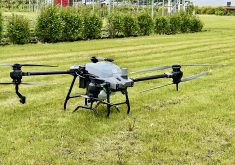It takes time. In fact, in Prince Edward Island, it’s taken since 2002, but starting in January the province will be launching its own apprenticeship program to help meet a growing need for farm workers.
In that time, farm organizations have had to build consensus and lobby for the program, an education curriculum has had to be designed and put in place, and farm work has had to be designated as a trade in the province.
“By having more well-trained employees on the farm, producers will be better able to adapt to agricultural advances in the future,” says Cape Wolfe cattle producer Cameron MacDonald.
Read Also

Producers aren’t panicking over tariffs and trade threats
The Manitoba Canola Growers Association (MCGA) surveyed its members this spring to get a sense of how trade uncertainty was…
The P. E. I. Agriculture Sector Council has been working on the apprenticeship concept since it hired NeoInsight in 2004 to investigate potential solutions to the island’s farm labour shortage, says Wendy Weatherbie, executive director of the council, formerly called P. E. I. Agricultural Human Resource Development Council.
That study paved the way for “farm technician” to be designated as an apprenticeable trade on Prince Edward Island in May 2005.
“Today’s farm operations require a high level of skills and knowledge in areas such as food safety, farm safety and the use of technologies,” says P. E. I. agriculture minister Neil LeClair. “The training of people to work in the industry will help it become more competitive and sustainable.”
A Farm Technician Trade Advisory Committee of agricultural employers and employees representing various commodities outlined the skills that would be required of a farm technician. Once these training requirements were established, the Nova Scotia Agricultural College was selected through a request for proposals process to develop the learning materials and deliver the program on Prince Edward Island.
“I am confident the skills of the farm technicians graduating from this course will be second to none,” says Leslie MacLaren, college academic vice-president.
The first study block will be delivered in January 2009, and the program will combine classroom sessions, hands-on learning and field experience. It will include approximately eight weeks of study blocks per year over three winters. The apprentice will work full time with a farm mentor employer for the remainder of each year.
“The program will provide an opportunity for farm workers to learn new skills and to receive recognition for existing skills,” says Weatherbie. “Participants will have access to training for licensing in key areas including pesticide certification and first aid.”
The apprenticeship program is offered at no cost to participants. With limited enrollment of approximately 15 participants entering the program each year, interested individuals have been encouraged to register well in advance of the January start date.
“As with any apprenticeship program on P. E. I., the block release training is paid for through skills development funding that pays one hundred per cent of the training costs,” says Weatherbie. “Participants must be EI eligible and are laid off for block release training.”
Funding for the program has been provided by Agriculture and Agri-Food Canada, the provincial government and the ag sector council. Participants in the program must first become registered apprentices through the apprenticeship board on Prince Edward Island.
Federal ag minister Gerry Ritz has called the program an excellent initiative that will help strengthen the farm workforce and lead to a more profitable farm sector.
“The program will provide the farming industry of Prince Edward Island with well-trained, versatile employees able to meet the ever-changing demands on farms,” says Weatherbie. “The participants will receive formal recognition for working in a skilled trade.”
Due to the diversity of subjects and skills that the apprentices will be required to complete, the Nova Scotia Agricultural College will be co-ordinating a variety of instructors from the college, industry and other special interest groups as needed.
The program will be taught on the island at Slemon Park, located in Summerside. Learning materials will be presented in a block release format in which the apprentices are released from their workplace for scheduled classroom, hands-on and demonstration sessions. These sessions will enable the apprentice to develop background, theoretical skills and supporting skills to complement the skills they develop on-farm.
“Farming is an increasingly complicated and challenging occupation,” says Bernie MacDonald, college vice-president of administration. “There is great potential for more innovative programming like this to come from the Nova Scotia Agriculture College to help industry meet its needs.”














